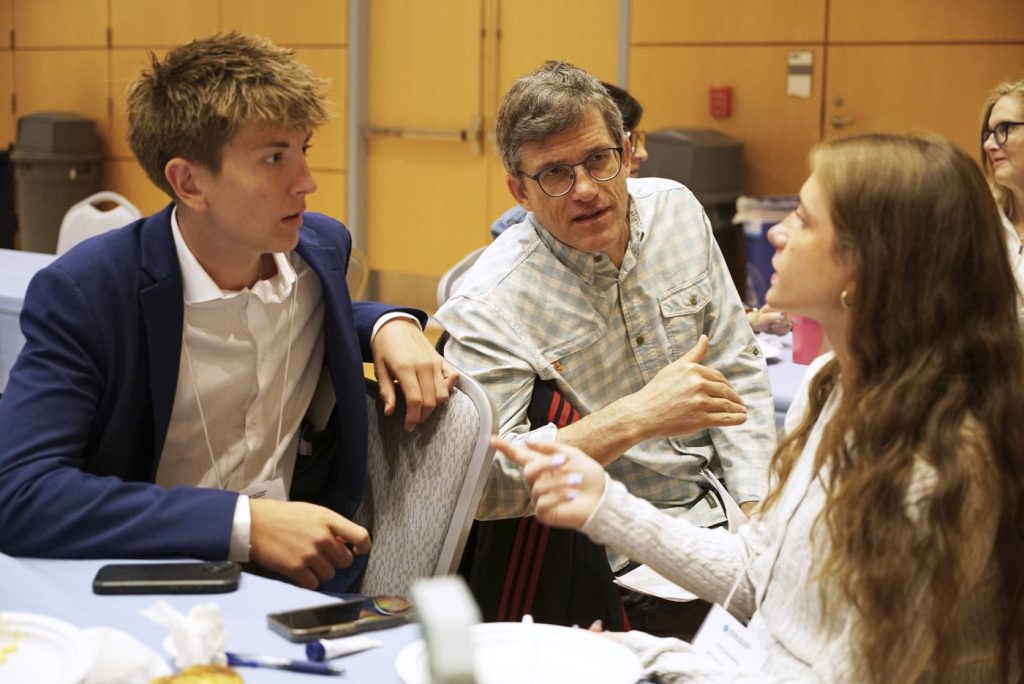At the National Speech and Debate Tournament, students engage in a traditional format of debate where they are assigned positions to defend or oppose, such as the right of people to secede from their government. In contrast, the National High School Ethics Bowl, held at the University of North Carolina, promotes a different discourse approach. Here, teams discuss ethical dilemmas without predetermined sides. Instead, participants explore questions like how to navigate critical commentary when a public figure dies, focusing on understanding and dialogue rather than confrontation.
The Ethics Bowl encourages students to engage in respectful and constructive discussions about complex issues, aiming to cultivate better citizens in a contentious society. Unlike typical debate formats where victory is achieved through rhetorical skill, Ethics Bowl prioritizes deep exploration of topics and understanding diverse viewpoints. Robert Ladenson, who developed the Ethics Bowl in 1993, emphasizes that ethical understanding involves comprehending opposing perspectives, not merely countering them with arguments.
For instance, in a case titled "See Spot Clone," one team, Harpeth Hall from Nashville, presents arguments against pet cloning, citing the existence of homeless pets and the ethical implications of cloning without the pet's consent. Their rationale includes concerns about potential health issues and the natural process of confronting death. On the other hand, Archimedean Upper Conservatory from Miami questions these viewpoints through inquiry rather than attack, exploring the implications of pet breeding and the moral permissibility of selfish actions like cloning a pet for personal happiness.
Judges also add complexity to the discussion by posing hypothetical scenarios that challenge both teams’ arguments. For instance, they might ask whether cloning would still be unethical if health problems were eliminated or if the cloned animal serves a greater societal purpose. This focus on nuanced dialogue highlights that, at the Ethics Bowl, the process of conversation is as significant as the conclusions reached.
The Ethics Bowl embraces real-world scenarios that reflect pressing contemporary issues, from reactions to the murder of a CEO to the ethical considerations surrounding social media and community engagement. Participants acknowledge the difficulty of grappling with these dilemmas while affirming that discussing them enhances their critical thinking skills and ethical understanding. Surveys indicate a profound impact, with participants reporting improvements in their ability to engage with differing perspectives and even shifts in their own beliefs.
The competition, while resulting in a winning team and a trophy, is characterized by its collaborative spirit rather than aggressive competition. Students engage in enriching conversations, fostering an environment where diverse viewpoints can coexist and thrive. Lizzie Lyman from Midtown High School in Atlanta emphasizes the value of these interactions over merely competing, noting that meaningful conversations come from thoughtfully addressing questions.
As the National High School Ethics Bowl celebrates its growth, now hosting 550 teams across the nation, personal transformations are evident. Participants, like Sona Zarkou from BASIS Flagstaff, reflect on how the Ethics Bowl has changed their approach to discussions toward more respectful and truth-oriented dialogues, moving away from previous debate habits they viewed as aggressive or rude.
Rhiannon Boyd, a judge and organizer of the Virginia High School Ethics Bowl, notes that divergent opinions among students can foster friendships rather than divisions, as evidenced by students from different political backgrounds forming a strong team bond despite their disagreements. The Ethics Bowl thus emerges as a pivotal platform for nurturing thoughtful, ethical discourse among high school students, preparing them for active participation in the complexities of modern society.











